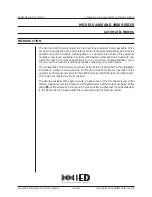
2-13
2
System Description
Visual Inspection of Console Interior
2. Verify that the TLS console barrier ground wire to earth ground in the power panel is a #12 AWG (or larger
diameter) conductor.
3. Verify that TLS console has chassis ground at AC Input Power connector (see item 3, Figure 2-5).
4. Verify that power conduit and sensor and probe conduits enter TLS console only through preformed,
designated knock-outs.
5. Verify that probe and sensor wiring and conduit meet Veeder-Root requirements (ref. manual P/N 577014-073).
6. If the system fails the intrinsic safety check, disconnect and cap the AC wires in the monitor, and disconnect
and cap all probe and sensor field wires in the probe and sensor junction boxes.
IMPORTANT! Do not apply power to the system until its installation has been checked and found to be in ac-
cordance with the instructions outlined in the Veeder-Root TLS-450PLUS Series Site Prep and Installation
manual (P/N 577014-073); the National Electrical Code; federal, state, and local codes; and other applicable
safety codes.
Visual Inspection of Console Interior
It is recommended that whenever troubleshooting, repairing, or replacing components, a visual inspection of the
overall condition of the system be made.
Turn off, tag and lockout power to the console before starting this inspection.
1. Inspect for signs of corrosion inside the console.
2. Check for broken or frayed insulation on all wires and be sure that the wires are secure at their terminals.
3. Check all PC boards for cracks.
4. Check to see that there is no loose or missing hardware for components (transformers, PC boards, brackets,
etc.).
5. Check to ensure that the boot disk (SD Card or SATA drive) is properly installed.
6. Check to see that all interconnecting cable connectors are firmly seated. Check connector ends for cracks and
flat cables for breaks.
7. Check fuse continuity and fuseholder contacts for corrosion.
8. Replace all covers after inspection.
9. Check touch screen display for signs of damage.
10.Check the mounting of the equipment to be sure all components were mounted properly and in accordance
with instructions contained in the Site Prep and Installation manual.
11.Verify that no unapproved modifications to equipment have been made, no unapproved parts are being used,
and previous repairs and modifications bring the unit to original factory condition.
12.All deficiencies should be corrected and damaged components replaced before continuing with procedures.
OFF
















































